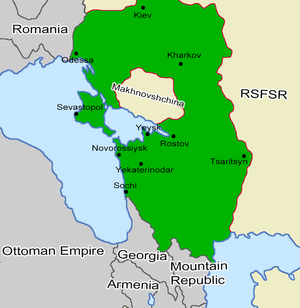It has been suggested that General Command of the Armed Forces of South Russia be merged into this article. (Discuss) Proposed since May 2024. |
This article needs additional citations for verification. (May 2024) |
The Armed Forces of South Russia (AFSR or SRAF) (Russian: Вооружённые силы Юга России, romanized: Vooruzhyonniye sily Yuga Rossii, VSYuR) were the unified military forces of the White movement in southern Russia between 1919 and 1920.
| Armed Forces of South Russia | |
|---|---|
| Вооружённые силы Юга России | |
 Most territory controlled by South Russian forces as of October 1919 | |
| Active | 8 January 1919 – April 1920 |
| Country | South Russia |
| Allegiance | |
| Size | 85,000 (January 1919) 160,000 (July 1919) 270,000 (October 1919) |
| Engagements |
|
| Commanders | |
| Commander-in-Chief | Anton Denikin (until 4 April 1920) Pyotr Wrangel (from 4 April 1920) |
On 8 January 1919, the Armed Forces of South Russia were formed, incorporating the Volunteer Army and the Don Army.[1] Subsequently, it included the Crimean-Azov Army, the Forces of Northern Caucasus and the Turkestan Army.
By October 1919, the army had 150,000 soldiers, which included 48,000 horsemen. The British had supplied 280,000 rifles, 4,898 machine guns, 917 cannons, 102 tanks, 194 airplanes 1,335 automobiles, 112 tractors, and what became known as Wrangel's fleet.[2]
In May 1919, Denikin reorganized the Armed Forces of South Russia. Vladimir May-Mayevsky took command of the Volunteer Army, known formerly as the Caucasian Volunteer Army. Sidorin took command of the Don army, while Wrangel took command of the Caucasian Army, consisting mainly of the Kuban Cossacks.[2]: 37–38
The Caucasus Army disbanded on 29 January 1920 and was replaced by the short-lived Kuban Army. Troops of the Kuban Army ended up surrendering by 18–20 April 1920 to the Red Army. The Volunteer Army continued to exist from 22 May 1919 until 26/27 March 1920, when the remaining troops were evacuated from Novorossiysk to Crimea. Most then merged there with Wrangel's forces.
In early April 1920, Anton Denikin, commander-in-chief of the AFSR, delegated all authority to Pyotr Wrangel, who took command of the so-called Russian Army, which included all remaining units of the AFSR after its defeat in Northern Caucasus.
Order of Battle of the AFSR, early 1919
editVolunteer Army (known as Caucasian Volunteer Army from 23 January – 22 May 1919), commanded by Gen. Anton Denikin (April 1918 – April 1920)
- 1st Army Corps (Gen. Kutepov)
- 2nd Army Corps (Gen. Mikhail Promtov)
- 5th Cavalry Corps (Gen. Yuzefovich)
- 3rd Kuban Cavalry Corps (Lt. Gen. Shkuro)
- Kyiv Army Group (Gen. Bredov)
Caucasus Army (split from Caucasian Volunteer Army on 22 May 1919), commanded by Lt. Gen. Pyotr Wrangel (21 May – 8 December 1919) and Lt. Gen. Viktor Pokrovsky (9 December 1919 – 8 February 1920)
- 1st Kuban Corps (Lt. Gen. Viktor Pokrovsky)
- 2nd Kuban Corps (Gen. Ulaguy, later Gen. Nahumenko)
- 4th Kuban Corps (Gen. Shatilov, later Gen. Toporkov)
Don Army (joined AFSR on 23 February 1919), commanded by Gen. Vladimir Sidorin (February 1919 and April 1920)
- Northern Group (Starshina Semiletov)
- Southern Group (Gen. S. Denisov)
- Trans-Don (Zadonskaya) Group (Col. Bykadorov)
Turkestan Army (formed on 22 January 1919), commanded by Ippolit Savitsky (April – July 1919), Aleksander Borovsky (July – October 1919) and Boris Kazanovich (October 1919 – February 1920).
- Transcaspian Composite Inf. Division (Maj. Gen. Lazarev)
- Turkestan Rifle Division (Maj. Gen. Litvinov)
- Cavalry Division (Maj. Gen. Oraz-Khan Sedar)
Gallery
edit-
Military map of March 1919 after the Armistice of Mudros
-
Volunteer Army recruitment poster saying "Why are you not in the army?"
-
Volunteer Army soldiers and officers next to a train in January 1918
-
Volunteer Army Mark V tank named "General Drozdovsky" in 1919
-
Volunteer Army armoured train "United Russia" on its way towards Tsaritsyn, June 1919
-
Local citizens welcome Denikin and officers to Tsaritsyn on 1 July 1919
-
Denikin and Wrangel during an AFSR parade in Tsaritsyn in July 1919
-
Don Army troops and Major General Vladimir Sidorin (center) with a Mark V tank in 1919
-
Don Army Austin Armoured Car named "Ataman Bogayevsky" in 1919
-
AFSR 2nd Infantry Division soldiers in Sochi, 1919
See also
editReferences
edit- ^ Kenez, Peter (2004). Red Attack, White Resistance; Civil War in South Russia 1918. Washington, DC: New Academia Publishing. pp. 267–270. ISBN 9780974493442.
- ^ a b Kenez, Peter (2004). Red Advance, White Defeat: Civil War in South Russia 1919-1920. Washington, DC: New Academia Publishing. pp. 20–23. ISBN 9780974493459.
Additional Reading
edit- Н.Е.Какурин, И.И.Вацетис "Гражданская война. 1918-1921" (N.E.Kakurin, I.I.Vacietis "Civil War. 1918-1921") - Sankt-Peterburg, "Polygon" Publishing House, 2002. ISBN 5-89173-150-9